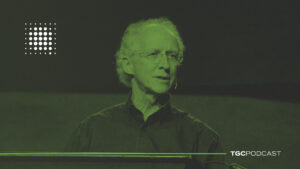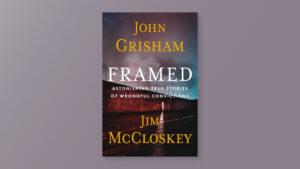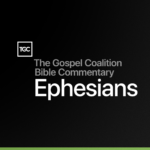In this sermon, Steven Baugh explores the biblical concept of the Kingdom of God, its theological implications, and its relevance to modern Christian life and ministry. Baugh draws from scriptural sources to illustrate how the Kingdom of God is both a present reality and a future hope, shaping Christian identity and mission in the world.
The following unedited transcript is provided by Beluga AI.
We’re about ready to start. We have six-page handouts which will be required for the midterm that will follow. The title of my talk is Thy Kingdom Come, and I’ve decided to talk until it comes. So we may be here a long time, we may not. It just depends. Let’s begin our time with prayer.
Almighty God, our heavenly Father, we thank you for our time together, particularly reflecting upon your scripture. What a glorious and stunning book it is to be able to hear your own voice spoken through these inspired men. We thank you for it, and we pray that you’ll help us to understand it, give us clear minds to think about these wonderful things of your scripture. Today we pray in Christ’s Name, Amen.
There are the handouts, so we can proceed with the test. Thank you, Ken. This is a six-page handout. And before you get nervous and think, “Man, this outline is just huge. He’s going to talk on and on,” I may do that, but the handout doesn’t indicate that.
This is a series of quotes that I want you to have in case you want to read in detail the kinds of things I’ll be referring to. This way I don’t have to read these quotes to be faithful to the authors. You can know that I’m faithfully referring to their ideas. What I’m going to do today is really combine two different lectures I gave you this last semester during my sabbatical time.
One was my inaugural lecture, primarily on the kingdom and covenant in Hebrews, which to me was so interesting because I looked at Hebrews 2 in greater detail than I had before. And I’d like to point out a few things in Hebrews 2 for you today. So that’s the passage that scripture will be focusing on later. But the other thing was a very interesting opportunity as the outgoing president of an academic society for the Evangelical Theological Society, where you give an after-dinner presidential address to a room filled primarily with dispensationalists.
I was speaking at Talbot seminary, and it was a very interesting time. And by the way, some of these folk might do friends, and we get along fine, but it was very interesting, particularly to be addressing some men who have been leaders in the dispensational movement. And very, if I told you their names, you’d recognize them. And to tell them what I thought, because I didn’t want to just go in and, you know, say nice things. I wanted to tell them what the reform view is on certain things, so they know from the horse’s mouth.
This is what we think, particularly in all millennial view. So I told him it was very interesting. I’m combining that. So those are the two things we’re working with. And really the one thing I want to begin with and then to show is that when you think about the kingdom of God, in my opinion, you must start with the consummation. You must start with the new heavens and the new earth in resurrected existence. That’s the kingdom of God in its pure definition. Anything else we say about the kingdom of God begins from that foundation.
That’s my thesis today, and I will try to show you that now in the handout. you’ll see I began with dispensational folk and their view of us. So, for example, a classic systematic theologian, Louis Barry Chafer. And I was, by the way, speaking at this conference to people from Chafer Theological Seminary up in the Los Angeles area, Orange County, wherever there. Very interesting. But in Chafer’s view, the reformed understanding of the kingdom metamorphoses a literal earthly throne and kingdom into some vague and wholly imaginary spiritual idealism. And this is pretty characteristic of the dispensational view.
The other quotes will show you generally of the reformed understanding of the kingdom is that it’s Christ ruling the hearts of people in a spiritual sense, but has no real concrete reality. And in some sense, I’m sympathetic to that. Some reformed people have talked about the kingdom in such general ways that perhaps we’ve led them to believe that.
So that a modern dispensationalist like Darrell Bach, who teaches at Dallas seminary and is well known as a progressive dispensationalist who, what we would regard as someone who’s really moving more toward a reformed understanding of the kingdom, nevertheless says to define the kingdom is not easy. Is the kingdom spiritual only? Is it political only? Is it manifest only in the church or in the millennium? Is it both spiritual and earthly? Does it come in phases? How are Israel and the church connected to it?
These are the questions operating below the surface in any definition of the kingdom. Now, what I find interesting about that is this is not my definition of the kingdom. My definition of the kingdom is not covered in that statement at all. All the options he surveys don’t get at how I understand the kingdom. And I’m going to make a lot of qualifications later, by the way, about how I understand the kingdom. So I want to be clear on that. But this is.
It’s an interesting exercise to read people discussing the kingdom. When you look at them, thinking about all the different options, and you say, “It’s not that. It’s not. No, I don’t think that’s what we’re saying.” And no, there are other options, but you’re not covering the things that I think should be stressed. Now, in the course of this handout I gave you, there are several reformed authors.
I highlighted Berkoff here, not because I think Berkoff is necessarily wrong, but I think in his discussion of the kingdom of God, he actually lends himself to this notion of dispensationalists, that the kingdom of God really dwells in the hearts of sinners. So right in the middle of the first quotation there, the rule of God established and acknowledged in the hearts of sinners, that’s the kingdom of God. In his understanding, you could say, well, that’s the kingdom right there, God ruling in the hearts of sinners. You really have to go on.
And at the very end of the second quotation, and I’ll have you look at that, where he says, the Bible clearly teaches us that the future kingdom will be ushered in by great cataclysmic changes. So what Berkoff calls the future kingdom, that’s the kingdom of God, in my opinion. So he acknowledges that because he’s confessional, he understands that, and yet he doesn’t elaborate on it. And I do think there’s a little weakness in his understanding.
If there’s a weakness in Berkoff, it’s probably because like so many american reformed folk in the 20th century, they’re reacting to dispensationalists in how they do theology. Quite frequently you find it in our writers. They’re really engaging in dispensationalism and not starting from our understanding and developing it that way. They’re developing it by way of polemic and that always you run into dangers when you do theology that way. It’s not necessary, but it often happens that your own understanding of truths are shaped by how people engage you and the options that they’re discussing.
And you’re saying, well, no, I fit into this option b, but really I would say I don’t fit into any of your options, really well. I just wanted to further look at a couple of other reformed people. I quoted Ritterbos, I quoted Hukama and referred to you to Kim Rittelbarger’s chapter nine. All three of those authors, I think, are going to tell you exactly what I’m telling you today. So there’s really nothing new. I don’t present them as. I’m not critiquing them, just the opposite. I think they’re defending the same view as I am.
And in a moment, I’ll at least refer you to a couple of the confessional documents. Now, when we think about the kingdom of God, let’s be clear about just the language. When we’re doing a study of the kingdom of God in the Bible, often you will zero in on the words kingdom. So you have Malkut in Hebrew and you have basilei in Greek. And really, you think about the kingdom of God centering around those two words as a method of doing theology.
Taking out individual words and looking at them is a convenient way to start, but it can’t be your end point in this case. It’s actually a quite convenient place to start, because the meaning of those two terms, both in Hebrew and in Greek, both of them have as possible meanings. One, kingship, dominion, rule, in other words, the activity of a ruler, what he does. So the kingdom of God can be viewed as a dynamic rule of God, where he’s actually exercising rule and causing things to happen. And that’s one of the meanings of kingdom.
It can be rendered kingship or dominion, and that’s true of the kingdom of God. So it’s a good place to start. The other thing is territory. A king rules somewhere, so you think about also citizens. But where is the kingdom of God? Where does he rule? And one thing we’ll be seeing is that Christ rules over all the earth. Now, that’s New Testament reality. That can’t be challenged in my understanding. But let me just say, because we’ll have to do this.
When we look at Hebrews, looking at individual words for kingdom, basilea and greek, and insisting that we have to have that term in a passage before we can understand the kingdom of God in the passage is just problematic. It’s like saying, well, I’m sorry, I can’t use this passage to understand the doctrine of the Trinity because the word trinity isn’t in the passage. It’s not in the Bible. You wouldn’t be a trinitarian at all. you’d be unitarian if you made that as your method.
You know, so many passages in the New Testament speak of the kingdom of God, where the term kingdom doesn’t appear. One of the places is the benediction in Hebrews, the great shepherd of the sheep. That’s a kingdom passage because that’s actually an ancient near eastern way to describe a king. He’s the shepherd of God’s people. This is what a king does, he shepherds them. This is what God did as king. He shepherded. So you have, you know, of course you have the wonderful psalm where, you know, the Lord is my shepherd.
This is the Lord is my king. Really, it is another way to say that because he guides and directs and does all the things that a king does. So when you think about a complex conception like the kingdom of God or any other biblical conception, you really have to deal with statements, scripture, not individual words. your starting point is statements of scripture and what it says in context. So that’s just a reflection on method. You can see how Tom.
Yes, there’s no definition scripture, but Christian came to southern California, is almost addicted to the phrase, “the kingdom of heaven is like unto,” right? There are scabs and scabs and scabs of examples. I think one time I counted 55 in Matthew alone and tried to come up with Old Testament parallels for them. So if Christ chose to introduce us to the kingdom by example rather than by definition, shouldn’t we be satisfied? you’re right. You read that statement in isolation, you think, well, Jesus didn’t define the kingdom, so it’s difficult to define.
Well, okay, he didn’t define a lot of words that he talked about. You pick it up from the meaning of scripture, and you read the Old Testament to figure out what he’s talking about. Often he didn’t define law, but we know what the law is, so. Yeah, but however, in his defense, Hookem is really reacting to people who say that Jesus defines the kingdom, and then that’s the theocratic millennial or premillennial understanding. This is just inductively, kind of sounds like, sorry. It’s a grade B enterprise. Yeah, no, it’s. It’s the polemic. It’s his polemic.
It’s because he’s engaged. He goes on after that statement to really talk to engaged dispensationalists, and that’s who he’s talking to. He’s trying to show them that we, too, are looking at scripture carefully, and that’s all he really means by that. So when you read on in Hokma, you think, well, okay, he’s just talking to them now, but when he gets to what he really wants to tell you, it’s quite good stuff, I think. So, yeah.
I got a little nervous at the opening of that, too, because I think the kingdom of God is exceptionally easy to define. It’s to talk about its implications where you start getting complex. Okay, so let’s define the kingdom, the kingdom of God, proper now. Here’s the point: The poor students who are here have heard this a million times from me. So I’m sorry that you have to go through this again, but this, in my opinion, is pretty important. What is the kingdom of God proper?
When you define something, you’re really defining it properly, meaning what it is in its pure form. Imagine if you saw an alloy of silver mixed with copper and other elements, and it really didn’t look much like silver. And he said, well, this is silver. It would be an amalgam, and it really isn’t silver proper. You really want to start with pure silver and think about silver in its pure state and then talk about its influences or presence. Now from that pure definition.
So the kingdom of God proper is nothing less than the consummation of the age. It is the redemptive renovation of everything. It is that which will follow the second coming of Christ, the resurrection of the dead, and the final judgment. It is, as a realm, the new heavens and the new earth. So if you want to think about what’s the realm of the kingdom of God, it is the new heavens and new earth of Revelation 21.
1 Then I saw a new heaven and a new earth, for the first heaven and the first earth had passed away, and the sea was no more. (Revelation 21:1, ESV)
Behold, I make all things new. The old things have passed away. Behold, the new things have come. That’s the kingdom of God. That’s where he dwells with his people. I will be their God, and they will be my peoples. Quoting that verse in Revelation 21, I will wipe away every tear. This is the kingdom of God. And in fact, that’s in Revelation. It’s really easy to show this because the angels, in anticipation of that, say, behold, now is the marriage supper of the lamb. Now is the kingdom of God and of his Christ. This is the kingdom. He is enthroned. He’s taking his rightful rule.
That’s the kingdom of God, where the triune God will assert his rightful kingship for endless ages with no challenges of any sort ever again. Because that kingship of God has been challenged, hasn’t it? As we know from reading Genesis, that’s the issue in Genesis: who is the king? So, there are four key attributes. The kingdom of God is one eschatological. That means it is the consummation, new heavens and a new earth. It’s not of this world.
In Hebrews 12, it is an unshakable kingdom that is coming, that we look for after the shaking of all things. Then there will be a kingdom that is unshakable, established. That’s the kingdom of God. That’s what Jesus was talking about when he said, the kingdom of God has drawn near. It was that that had drawn near. It is the world to come, the age to come. The two terms in Hebrews we’ll be looking at. It is heavenly. That’s the second attribute.
It is a direct, uncontested reign of the triune God with his people, who will dwell in his presence, in incorruptible resurrected existence. This is 1 Corinthians 15: Incorruption. Not just incorruption, but incorruptibility, the impossibility of ever being corrupted again. That’s what resurrection means in spiritual bodies. Spiritual using it in Paul’s definition of the Holy Spirit. Third is spiritual. The Holy Spirit is the down payment of the age to come. As the Holy Spirit dwells in us, he brings us the powers of the world to come.
4 For it is impossible, in the case of those who have once been enlightened, who have tasted the heavenly gift, and have shared in the Holy Spirit, 5 and have tasted the goodness of the word of God and the powers of the age to come, (Hebrews 6:4-5, ESV)
Hebrews 6. We taste of that, we have experience of that. But it’s that that will be fully consummated, where the Holy Spirit will renew everything, and we will dwell in his presence directly and intimately. And in fact, with spiritual bodies, whatever that means. We don’t know what they will be like. We know we will be like the Lord Jesus Christ. First John 3, and then finally, it’s christocentric. The Lord Jesus is the only way into this kingdom.
It’s a kingdom where the second Adam has paved the way, and he has sat down at the right hand of the throne of the majesty on high in that kingdom to be the firstborn from the dead. In resurrection, it means he’s entered into the world to come because he’s resurrected. He’s entered into the existence of the kingdom of God. And by being united to him, that’s our contact with the kingdom of God. But he has finished his task.
In Hebrews 9, it says, “Well, we look for him to come no longer to make atonement for sin.” He’s accomplished that, but merely to wed him, wed us to himself, and to bring us into resurrected existence. That’s when every enemy is destroyed. The ultimate enemy is death. So, what the kingdom is not properly is the question. Now, that word properly is the key here. What is the kingdom not properly? Well, the kingdom of God properly is not the church in this age.
Now notice I didn’t say that the power of the kingdom, the presence of the kingdom, is not in the church. That’s true, but it is not the church proper. And you know what I mean by that. We’re pilgrims going to the kingdom. The church now is a church militant. The church triumphant is the kingdom. That’s where our experience of the kingdom will be. Consummate and pure. And that’s what the kingdom represents now, is giving us the power and the experience of the power of the kingdom so that we will infallibly be there.
It is not the rule of God in the hearts of believers alone. That’s true, but that’s not how you define the kingdom of God. That’s just problematic for me to say, well, the kingdom of God is God ruling in our hearts. You can see if you think it’s the resurrected existence in a new heavens and a new earth that’s not been consummated yet, so you can’t restrict it to a spiritual rule of God in the heart. It’s just problematic to think that way.
And of course, in the context where I originally talked about this, I was pretty plain. It’s also not a millennial rule in Jerusalem for 1000 years. That’s not the kingdom of God, because, as Paul says, flesh and blood cannot inherit the kingdom of God. You can’t have non-resurrected people dwelling in the kingdom of God.
50 I tell you this, brothers: flesh and blood cannot inherit the kingdom of God, nor does the perishable inherit the imperishable. (1 Corinthians 15:50, ESV)
Now, with all that said, do I have in the handout the Heidelberg and the Westminster shorter? Okay, well, you can read those as well as the Nicene Creed. This is just Nicene Christianity.
Now, Tom, can we be improper and jump over your word proper and ask the question: what foretastes of the kingdom, or what partial entries into it, are allowed in this age? Think about the churches that say the people of God gathered for his worship, in a sense, are a. That’s not wrong at all. No, no, there’s nothing wrong with that at all. Nothing I said has tried to undermine that at all. And that is where the authority of the kingdom is. It’s been given as a spiritual rule of the elders, hasn’t it?
And that’s the authority of the kingdom. That’s also the presence of God, especially with his people, which will mark the kingdom of God as in a pure, final, consummated form that the kingdom represents. We have a foretaste of that now. I think the best way to think about it is if resurrection is essential, not just optional, but essential for experiencing the kingdom. 1 Corinthians 15:50, “Flesh and blood will not inherit the kingdom of God.” He goes on. If that’s true, then how have we experienced resurrection?
Regeneration is a reception of the Holy Spirit, is a foretaste. Seeing our elder brother resurrected as firstfruits, second Adam, last Adam, that’s. We see resurrection we church today experience. When we talk about the kingdom of God, it’s that the proper stuff that we have an anticipation of. But you start with the proper. That’s all I’m saying. You don’t start with the current understanding of it or current experience of the kingdom in your definition. That’s all I’m saying. Really simple. But it’s interesting, and I have done this to ask reformed pastors sometimes, what is the kingdom?
And they say, well, you know, we meet in the church every week and we experience, and that’s where they start. So it’s not either bad theology or a poetic excess. When we sing from the Trinity, him will finish in thy new creation, pure and spotless let us be. No. If any man be in Christ who is a new creation, no, we have an anticipation of that through the spirit, but it’s not consummated yet. But it’s real. We have tasted of the powers of the age to come. Yeah. And you can ask questions. Students can’t.
Graduating students, in particular, have asked all the questions possible, believe me. No, just kidding. Are you with this definition speaking? It seems to me that the issue that we have so much of the kind of spiritual meaning by that, not physical, not real in the sense, but so much in our, all of our churches, reformed churches also, unfortunately, almost thinking of heaven is just that clapping of wings and singing all together, the Victorian picture of being on clouds. That is. I think that’s clearly how the Bible understands the kingdom of God. That’s what it is.
Let me give you another example that actually ties into Tom’s question earlier. The great fruit of the old covenant was the covenant formula, as it’s called, is the great blessing, “I will be your God and you will be my people.” Now, God was the God of Abraham, Isaac, and Jacob when he brought the children of Israel out of Egypt, and he declared to them, “I am your God.” I remembered my people’s suffering. He was their God.
In the New Testament, that’s reiterated time and again, except interestingly, it’s the God and father of our Lord Jesus Christ, by whom we have God as our God. But in Hebrews 8, he says, the new covenant blessing. There’s four blessings of the new covenant, that Jeremiah 31, one of them is, I will be their God and they will be my people. Notice it’s future. When I make a new covenant, then I will be their God and they will be my people.
But then Revelation 21 says, after the new heavens and the new earth, then God declares, I will be their God and they will be my people.
3 And I heard a loud voice from the throne saying, “Behold, the dwelling place of God is with man. He will dwell with them, and they will be his people, and God himself will be with them as their God. (Revelation 21:3, ESV)
It’s not until the new heavens and a new earth that we really experience the fullness, the reality, the pure form of God being our God and we being his people. But of course, he’s our God ahead of time. I mean, think about Jeremiah 31. He says to the Israelites, through Jeremiah, after I make a new covenant, then I will be their God and they will be my people.
33 For this is the covenant that I will make with the house of Israel after those days, declares the Lord: I will put my law within them, and I will write it on their hearts. And I will be their God, and they shall be my people. (Jeremiah 31:33, ESV)
Well, just telling that to them through Jeremiah was an act of being their God and them being his people. So he already is committed to them to bring that to pass. But what he’s saying through that is, it’s not until you arrive in my presence, face to face, that you will know me as your God and you’ll be my people. And the communion that that represents will be experienced in its glorious, eternal fullness, of which you have only the barest glimpse now. So it’s the reality.
And, you know, if we want to think about that as concrete, it’s, yeah, you know, spiritual for us just has a whole different meaning than it does in the Bible. To us, it means sort of vague and unseen. In the Bible, it means the real stuff. Stuff, the eternal lasting stuff, the real thing in God’s very presence. That’s part of what that term has as its connotation. So I agree with you.
Well, I know this is shocking, but we’re actually going to look at the Bible. Hope you don’t mind. Hebrews 2. This has all been really setting you up for this past passage, which to me has just been a really glorious, edifying experience of rereading this. I already thought I knew it pretty well, but typically, when you think you know a passage pretty well, you’re really just setting yourself up to know how little you know about it once you start going after it again. In Hebrews 2:5, he opens by saying,
5 For it was not to angels that God subjected the world to come, of which we are speaking. (Hebrews 2:5, ESV)
Now, the question there is, how is it that he’s been speaking about the world to come? Because he has not used that term yet. But he says to us that what he’s already been talking about really is the world to come. And yet we haven’t heard the term world to come. We don’t. If you’re not attuned to what he’s been talking about, you’re not really sure. How is it that you’ve been talking about the world to come?
Well, it’s a long story, but in short, in particular, it’s the great salvation in the previous few verses that really is the thinking of what the world to come is in its center here. And notice that he hasn’t subjected the world to come to angels. Now he’s going to point to the testimony of Psalm 8 here in verse six. For testimony is borne by someone somewhere, my favorite quote of the Bible, because I sometimes will forget who wrote what someone wrote somewhere, you know, and I don’t have to remember all these verse numbers.
I’m as ignorant of verse numbers as Paul is, so I don’t mind seemingly invented in the middle ages. Anyway, I always, I frankly don’t like verse numbers. Sometimes they get in the way of looking at continuity, because sometimes it’s really chapter two has to be, you don’t want to separate it. It really is part of chapter one. In fact, Hebrews is one long sentence until chapter 13. It really could be, might have a few paragraph divisions, but not very many. So he’s been talking about the world to come.
Now, just because of time, I’m going to make the assertion that’s the kingdom. The world to come for him is the kingdom. He doesn’t use the term kingdom here, but he’s developing that world to come. When he talks about kingship, as it’s stated in Psalm 8, you see, it’s the testimony of Psalm 8 concerning, crowned with glory and honor and all things in submission to a king, that’s the world to come concerning which he’s speaking. So the conceptions of subjection, of enemies crowned with glory and honor, those are kingdom issues, he says.
And it wasn’t to angels that that was given, but to whom? Well, now he quotes Psalm 8, and Psalm 8 clearly is talking about mankind. And when he says, the psalmist says, “you have made him a little lower than the angels,” he’s talking about Adam and Eve and in their unity. So you could say man as both male and female, as Genesis does. That’s the way you should think of that. So, what is man or the son of man? It is male and female being man. That’s who he’s talking about.
So he’s not talking specifically about Christ here in Psalm 8. So that when it says the Son of man, you should really just read that as the Hebrew would. It’s just a human being. It doesn’t mean the son of man is a technical title. Now, this is debatable. There are respected commentators who say, well, no, Hebrews really thinks that that’s a title of Christ, and he really has Christ in mind here. But I disagree, I think, in Hebrews when he says, now, it wasn’t to angels that he subjected the world to come.
And he quotes Psalm 8. I think he’s talking about us human beings, just like Psalm 8 is.
7 You made him for a little while lower than the angels; you have crowned him with glory and honor, 8 putting everything in subjection under his feet.” Now in putting everything in subjection to him, he left nothing outside his control. At present, we do not yet see everything in subjection to him. (Hebrews 2:7-8, ESV)
Now, the critical commentators look at this and they say Hebrews is misquoting the psalm. But I don’t agree. Hebrews knows what the psalmist is up to really well, but then he goes on. So after quoting the psalm about the crown with glory and honor and putting all things in subjection under his feet, in verse eight, he makes the point when it says all things in subjection. There is nothing accepted there. But we don’t see that.
Now, here’s the question: We don’t yet see all things in subjection to him. Who is the “him” here? Some people say that’s Christ. I don’t. Some people think all things in subjection to Christ. We don’t see that yet because there are still enemies in Christ’s kingdom. He hasn’t reached the full consummate glory he will have in the kingdom. I just don’t agree with that reading. I think he’s still reading the psalm as it was originally understood as talking about us human beings.
We don’t see all things in submission to him, meaning human beings, because that subjection of all things is given to us, but we don’t see it yet. Notice verse five again; it wasn’t to angels that he subjected the world to come. Now, what the author has done is he’s read Genesis; he’s ready. Psalm 8. And he says this: in order for this to be fulfilled, in order for God to give everything under our feet, which we don’t see, there must be a world to come where this is fulfilled.
So this text must point us to the necessity of the world to come. In order for God’s original created state of human beings to be fulfilled, there must be a succeeding age where this is fulfilled because we don’t see it now. But that’s not all he says.
And notice if you’re reading the Greek, as all the alums are, all the upcoming alums are, all the ones who want me to sign their diplomas are. Notice it says in Greek, it brings Jesus forward so that he’s the focus. You see, there’s a contrast.
One of the reasons why you have emphasis in the Bible is contrast. We don’t see x, but we do see y. And there’s a contrast. This is contrasted with that. So the contrast here is we don’t see everything in subjection to him, but Jesus we do see is what I mean by bringing Jesus forward. The name Jesus is put earlier in the sentence than you expect. And it says, we don’t see him, but we see Jesus crowned with glory and honor, picked up from Psalm 8, as it says there right out of Psalm 8.
We don’t see ourselves in that state, but we do see ourselves in that state when we see Jesus, because he was put in that state as the one who would represent us as high priest and bring us into glory. This is where sometimes the commentators run into trouble. They stop there at verse nine. You really have to read verse ten. What was the purpose? It’s not the only purpose, but the purpose of the incarnation that he’s emphasizing is expressed in verse ten, which in almost all of our versions and Greek editions is a separate paragraph.
But it shouldn’t be because it reads this way, for it was fitting for him, on account of whom are all things and through whom are all things. In bringing many sons to glory, there’s the key. See, the glory is picked up from Psalm 8. The glory is the glory of kingship, with all things in subjection under our feet, crowned with glory and honor in bringing the many sons to glory, to lead the high priest of their salvation, to perfect him through sufferings.
We don’t see ourselves crowned with glory and honor in the kingdom, but we do see Jesus crowned with glory and honor in, in the kingdom as the one who had to be perfected through sufferings to bring us into glory and honor of having all things put under our feet. So the kingdom of God is a redemptive reality. This is why he calls it salvation. The kingdom of God represents a reversal of the fall, a more glorious reversal, obviously.
And it is an overthrow of the abandonment of the kingdom by human beings in the fall and a reestablishment, because God has never given up his kingdom. He’s always been king and always will be, and there’s never any challenge to his sovereignty. But now he will make that universal and manifest, and this is what he has done to achieve that. He led his son into the world to suffer, to bring us into glory. Now you can see why. If this is dealing with the kingdom for us, it is secured. It is Christ centered.
It is a redemptive thing, but in its pure form, its future, because we don’t see ourselves crowned with glory and honor yet with all sayings and subjection under our feet in the world to come. But we do see Jesus, and seeing him entering the kingdom to lead many sons to glory. And then he goes on to talk about who we are. We’re his children, we’re his brothers, and he quotes Psalm 22.
I will declare your name in the great assembly, my brothers. This glorious psalm, if you’ve never studied it, do. The end of that psalm is actually stated in such a way that you can tell that the psalmist is speaking of Christ, where he says, “I will declare,” he says it with great resolve. I am determined to declare your name in the great assembly. Why? Because it involved my God. “My God, why have you abandoned me?” I mean, this is Christ at the cross, determined to achieve bringing brothers and sisters into God’s presence.
That’s his resolve in the cross expressed in Psalm 22. Hebrews quotes that regarding us. Well, we give you a big lunch, we give you a nice hot room, we give you a boring lecture, and it really is to make your time here pleasant. And he drones on and on and yells at you about defining the kingdom proper. So what is it that we’ve talked about in Psalm 2? Excuse me, Hebrews 2 in particular.
I’ve tried to show you that the kingdom of God is a world to come in its proper form, where all things are put into subject rejection to us in great glory. And Christ has secured that in his high priestly ministry, and he has brought us into glory in principle. And when we experience that in resurrected glory in the new heavens and a new earth, then we will say, thy kingdom has been come. Thy kingdom has come. Until then, I submit that’s what we pray in the Lord’s prayer. We say, thy kingdom to come.
We’re praying for the last judgment, the coming of Christ, and the establishment of a universe-wide purification and resurrected glory. Until then, we work to glorify the king’s name by bringing many citizens into the reality of that world. Now, there are many implications now of this view of the kingdom. Then you know many of your ideas that you’ve already come about the kingdom. I’ve not been challenging them at all. I’ve just said we should understand the kingdom in its pure form as purely eschatological. And I think our Hebrews 2 passage shows that.
Do you have questions or comments? No. you’re working for evangelism and the glory of Christ by spreading his word. But you’re not praying that people would be saved. you’re praying for the final judgment in the eschaton. Is the new heavens and the new earth coming only there? Yeah, I mean, if you want to pray for evangelism, pray for the conversion of people. But when Jesus taught us to pray that God’s kingdom come, that’s what we are praying. As our confession says, the kingdom of glory might be established.
So, the kingdom of glory in the shorter catechism. That’s the kingdom. That’s thy kingdom come. He’s looking at me skeptically. I want to join him in that skepticism. It seems to me it’s not trivial that in the Lord’s Prayer, it’s almost offered as a definition, Thy will be done on earth as it is in heaven.
10 Your kingdom come, your will be done, on earth as it is in heaven. (Matthew 6:10, ESV)
Sure, sort of a definition of thy kingdom. No, it’s an effect of the kingdom. It’s an effect that God’s rule would so work in this world as his name be glorified in this world, and proceeding in the task of evangelism accomplishes that. I never hope I didn’t challenge that idea. But when you’re praying for the coming of the kingdom proper, it’s the Eschaton. Now, until then, we have a connection to that eschaton, don’t we? You know what I mean by Eschaton, by the new heavens and the new earth. But if you’re going to define the kingdom, define what it is. That is my thesis.
And what it is is the Eschaton, the whole package. We have the rule of Christ at the right hand of the throne of God, where he rules all things by the word of his power. Now, yes, Christ rules over all people to accomplish his purpose on earth. Now, the specific redemptive rule of God to bring us into union with Christ, sanctification in our growth and union with Christ, and bring us into his heavenly kingdom. We have. Now, we are citizens of that kingdom, aren’t we?
13 He has delivered us from the domain of darkness and transferred us to the kingdom of his beloved Son, (Colossians 1:13, ESV)
Or someone says somewhere, but what is the kingdom of God? What is it that we’ve been enrolled as citizens in? Is it what we experience now? Or is it resurrected existence in a new heavens and a new earth? That’s the question I’ve been trying to answer. It is. It’s a stage where we experience the power of the resurrection now by renovating us in our souls. But it is not resurrection consummated. So we’re connected to the kingdom.
I’ve not denied that. I’ve affirmed that repeatedly. But connected to what? Is the question? Connected to resurrection, existence, and a new heavens and a new earth. Now, that’s what we’re connected to. You have to think that way. I’m trying to turn your thinking backwards or upside down. We’re so focused on what the kingdom is doing now that we tend to define it. Now in reformed circles, this is what the kingdom is right here, and I think that’s improper. This is the effect of that future, glorious, transformed, consummated existence that we now have an experience of.
This is what it looks like here, but that’s what’s happening. It’s that stuff that has made an effect upon us. Now, that’s the exciting thing about reformed theology, is that we understand that it’s that that has come to us, not something else. What we experience now is just a foretaste. It’s a down payment. Don’t you think part of this is so important? What you’re emphasizing seems to me, because we have such a small view of the kingdom, something that’s kind of in our hearts. And yes, God’s saving souls, and that’s happening all around.
But the kingdom of God is great redemption. Yeah. I mean, this is all that God created, right? To be restored. Yes. This is bigger than forgiveness of sins, and this is. And that’s the center of the kingdom, though it is a redemptive reality. And the forgiveness of sins was no mean thing, because the Son of God had to become incarnate to accomplish that. But then he accomplished more than simply forgiving us and leaving us in the state we find ourselves now in this age.
What we, the experience we have in this age, is as nothing compared to the glory of the coming age. This is what Paul says, isn’t it? So that’s where our focus should be. And I’m not saying we should so concentrate on the future that we don’t even think about our task in the church today to bring lost souls into the experience of the kingdom. I’ve never even had that thought. But it’s that kingdom that I want lost souls to experience like I do. That’s the key.
That’s what makes evangelism so exciting, is you’re bringing people into an experience of a transforming existence that they can even have a foretaste of. Now that is glory in 2 Peter 1:4.
4 by which he has granted to us his precious and very great promises, so that through them you may become partakers of the divine nature, having escaped from the corruption that is in the world because of sinful desire. (2 Peter 1:4, ESV)
There’s something that’s been overused by the Eastern Orthodoxes, a matter of participation in the divine being. Is that speaking of earthly existence, or is that speaking of a future after the end? I think that passage talks about its moral qualities. I really think that’s an ethical passage.
When you look at the context, it talks about his goodness, that we have been transformed through regeneration to experience part of God’s kingdom character as being good, and that’s sanctification. So it’s not becoming divine in our being and no longer human. It’s a change in character, we would say. Yeah, sure. Evangelism, participation in the ministry of the church, advancing the name of Christ. you’re going to have to talk to Van Gruenin about that. I’ve never had a thought about Christian school. I just read the Bible. We’re done.
Involved in Women’s Ministry? Add This to Your Discipleship Tool Kit.
 We need one another. Yet we don’t always know how to develop deep relationships to help us grow in the Christian life. Younger believers benefit from the guidance and wisdom of more mature saints as their faith deepens. But too often, potential mentors lack clarity and training on how to engage in discipling those they can influence.
We need one another. Yet we don’t always know how to develop deep relationships to help us grow in the Christian life. Younger believers benefit from the guidance and wisdom of more mature saints as their faith deepens. But too often, potential mentors lack clarity and training on how to engage in discipling those they can influence.
Whether you’re longing to find a spiritual mentor or hoping to serve as a guide for someone else, we have a FREE resource to encourage and equip you. In Growing Together: Taking Mentoring Beyond Small Talk and Prayer Requests, Melissa Kruger, TGC’s vice president of discipleship programming, offers encouraging lessons to guide conversations that promote spiritual growth in both the mentee and mentor.





















